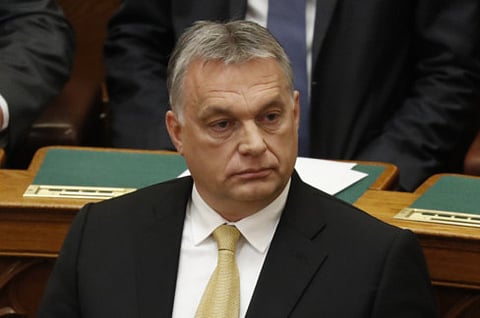Brexit is boosting Orban’s ability to disrupt the EU
Hungary’s prime minister is trying to cultivate ties with Eurosceptic and anti-immigration leaders across the continent

Tens of thousands of Hungarians have been protesting against Viktor Orban only weeks after his populist right-wing Fidesz party secured another strong majority, renewing its hold on power until 2022. These pro-democracy campaigners surely deserve solidarity and practical support from people who care about Europe. At the same time, it’s important to look more closely at Orban’s wider regional ambitions. Strongmen can be emboldened by their own success.
We don’t yet know how far Orban will go in his democratic backsliding. Signs of more pressure being piled on NGOs are hardly reassuring. But Orban also has his sights on Europe’s shifting geopolitics, and he must be buoyed up by the fact that far-right politicians across the continent have greeted his re-election with enthusiasm.
Orban will seek to draw benefits from Britain’s departure from the European Union. One of the paradoxes of Brexit is that alliance-building within the European club is becoming more important than before. Many European Union (EU) member-states, particularly smaller ones that have often sided with the United Kingdom, now realise they will have to put more effort into nurturing groups of like-minded allies.
Brexit means Germany and France will be the EU’s sole heavyweights. Meanwhile, the return of nationalist reflexes has eroded respect for its norms in parts of central Europe, fostering tensions with Brussels. Orban’s overwhelming electoral victory has arguably made him the continent’s main political challenger to French President Emmanuel Macron, who’s been building his profile as Europe’s pre-eminent liberal democratic voice. Orban is betting his anti-immigration rhetoric will garner support in next year’s European parliament elections.
Orban clearly hopes a process of realignment across the continent will play into his own hands. Government sources in Budapest indicate he now wants to construct a broader Eurosceptic block around Hungary and Poland — one that would take on the role previously played by the UK. That bloc would counterbalance integrationist agendas set by the Franco-German couple.
Poland’s nationalist, ultraconservative government (which will face elections in October 2019) is ideologically aligned with Orban’s vision of “illiberal democracy”. Poland’s size and voting rights make it an important player. Orban will continue to leverage the Visegrad group of Poland, the Czech Republic, Slovakia and Hungary, which has sought to increase its influence in the EU, especially since the 2015 migration crisis. Another key ally is Bavaria, whose conservative CSU party has been a fierce critic of German Chancellor Angela Merkel’s refugee policy.
For all his provocative rhetoric, Orban plays a canny game within Europe. To be sure, his record within the EU has been obstructionist rather than constructive. Yet, behind the closed doors of diplomatic summits he has also at times shown himself to be more nuanced and cooperative.
So far, Orban has met with limited success in building coalitions. For one thing, the Visegrad group is far from homogeneous. Last year, it became deeply divided over the question of posted workers in Europe (sent by companies to work temporarily in another member state), when the Czechs and Slovaks chose to work out a compromise with Macron. In addition, Slovakia is a member of the Eurozone (unlike the other three countries) and it is open to plans for deeper integration.
As a result, Orban is trying to cultivate ties with leaders elsewhere who share similar Eurosceptic or anti-immigration views — including Italy’s populist parties, who are attempting to form a governing coalition, and Austria’s government, where the far right holds important ministries.
Orban wants at once “less” and “more” Europe. He is intent on weakening the EU by preventing it from interfering in national policies on justice and home affairs, which he views as an infringement on national sovereignty. At the same time he is in favour of building up the single market, strengthening the EU’s external borders, developing common defence policies, and further EU enlargement.
What influence does he truly wield? Perhaps fixating on Orban risks exaggerating his real importance. Yes, he’s both a highly controversial and a gifted politician — at least judged by his staying power. But Hungary remains a small country in the EU’s east, and its political situation has brought a degree of marginalisation.
Still, the man is a disrupter — and has no qualms about playing on deep-seated Hungarian grievances. In his 1946 book, The Misery of Small Eastern European States, the Hungarian political scientist Istvan Bibo described the “collective neurosis” and existential angst of nations that have experienced multiple border changes and the sway of larger powers. Those traumas can lead to “political hysteria” if they are exploited by cynical populist leaders, he wrote.
The year 2020 — which marks the centenary of the treaty of Trianon, through which Hungary lost two-thirds of its territory after the First World War — could provide Orban with a symbolic opportunity.
No one should underestimate the explosive nature of the national question in Hungary and some neighbouring countries. Since 2014, Hungary has quietly granted citizenship to approximately one million ethnic Hungarians living in Romania, Serbia, Slovakia and Ukraine. Relations with Ukraine have become fraught over the status of its Hungarian minority. Orban’s government recently blocked Ukraine’s rapprochement with the EU and Nato cooperation, in a move that will have pleased Russia.
What this points to is that Orban can inflict yet more damage on Europe if he chooses: By fuelling tensions over national minorities and reigniting territorial disputes. In that scenario, he would rely on the sympathies of far-right parties across Europe, and on his transactional relationship with Russian President Vladimir Putin. And he’s confident he can preserve his position within the European parliament’s mainstream rightwing group
Brexit and Orban’s ambitions may look worlds apart, but together they bear on Europe’s new, unpredictable geopolitics.
— Guardian News & Media Ltd
Milan Nic is a Berlin-based specialist on central and eastern Europe.


